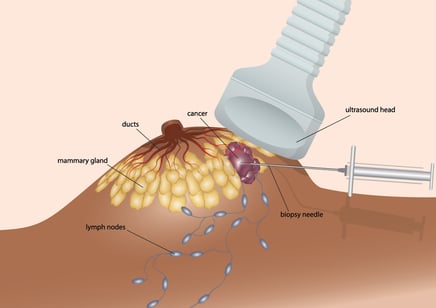Preventing Cancer, Liquid Biopsy, and Eliminating Cancer Surgery
6 min read

Colorado Breast Cancer Oncologist Dr. Ling Ma Shares Her Vision of Future Cancer Treatment
“The future of oncology is preventing cancer,” says Dr. Ling Ma as she describes her predictions and hopes for future cancer treatment. From liquid biopsy to eliminating the need for surgery to genomics and immunotherapy, the breast cancer doctor at Rocky Mountain Cancer Centers (RMCC) finds much that’s promising in both current and predicted advancements in cancer treatment. Still, the most important step is both the most obvious and also perhaps the most difficult: Preventing cancer.
Preventing Cancer
 Dr. Ma calls preventing cancer a “higher level of cancer care.” She says we should “prevent it, screen for it, not treat it.”
Dr. Ma calls preventing cancer a “higher level of cancer care.” She says we should “prevent it, screen for it, not treat it.”
Preventing cancer entails more than simply getting the screenings recommended by your doctor on the appropriate schedule. Examples include recommendations like having annual mammograms for breast cancer starting at age 40 and colonoscopies for colorectal cancers starting at age 45. Additionally, recommendations may vary depending on individual cancer risk factors.
Related Read: The American Cancer Society has a very helpful list of cancer screening recommendations by age and cancer type.
Though doctors still advise regular cancer screenings for preventing cancer, new technology that provides in-depth analysis and genome mapping is even more important to identify people and families with higher cancer risks.
“RMCC is doing a great job at genetic counseling,” Dr. Ma says.
High-risk patients at Rocky Mountain Cancer Centers are tested for genetic mutations that are associated with increased cancer risk. They are also asked to have more comprehensive tests with rapidly improving technology in the future. “Ten years ago, there were only several mutation markers (to test for). Now there’s an 84-mutation panel test.”
If deemed appropriate, members of their family will also ask to be screened for genetic markers for cancer. Some test kits use blood, while some use saliva. Someone who chooses to be screened for genetic cancers can even do the collection at home.
“We’re getting better and better at picking up potential mutations through a patient’s family history.”
Knowing that your family carries a cancer gene allows an individual to be more proactive about screenings and testing that would diagnose cancer early. But, who knows? Maybe the future of cancer treatment could stop these gene mutations from ever becoming cancer.
Liquid Biopsy, Eliminating Surgery, and Other Improvements for Patient Comfort
A liquid biopsy uses a blood sample to gather important information about a tumor and is less invasive than a tissue biopsy. It was approved by the FDA in 2020.
Liquid biopsy for cancer treatment is already being used at RMCC and elsewhere, though not universally. In instances where a tumor can’t be easily accessed for tissue biopsy or when a traditional biopsy is deemed too traumatic, a liquid biopsy is a “good alternative” to get genomic information about a cancer, says Dr. Ma.

While the technology already exists to avoid tissue biopsy, Dr. Ma hopes future cancer treatments will also allow patients to avoid surgery to remove cancer, as well.
There are many risks and side effects of surgery. Surgery is painful, can lead to infection, may require a hospital stay, and can have long-term side effects like scars or lymphedema. But, what if surgery could be avoided?
“Right now, surgery is a major element of cancer treatment,” Dr. Ma explains. “You have to remove breast cancer to cure it. I hope in the future we can biopsy and target treatment so precisely you can cure cancer without surgery.”
“Cancer patients would have a hugely improved quality of life if we could avoid surgery.”
Genomics for Targeted Therapies
Genomics is a branch of molecular biology that performs in-depth study, analysis, and mapping of genes. The advancements in this field of study are rapid, practical, and extremely exciting when it comes to the future of cancer treatment. While one application for genomics is preventing cancer (discussed above), another application allows for the targeted killing of cancer cells – with fewer side effects for the patient.
With precision medicine or targeted therapy for cancer, oncologists can use a biopsy (either tissue biopsy or liquid biopsy) to understand the tumor’s DNA. Certain mutations in the tumor’s genes can be exploited by targeted cancer drugs to stop cancer replication. Hundreds of targeted drugs have already been approved by the FDA and many more are in clinical trials.
“One of the major things we do at RMCC is clinical trials,” says Dr. Ma. “There are lots of opportunities through US Oncology (a national network to which RMCC belongs). I have a 90-year-old patient who can’t tolerate chemo. We identified an actionable mutation in his biopsy but there’s no drug on the market for it. However, we found an agent in trials and got him in it. He’s tolerating it very well.”
Dr. Ma has countless more patient success stories with using targeted cancer treatment, whose benefits include: fewer side effects for the patient, oftentimes greater efficacy than traditional cancer treatments, and being administered with an oral medication instead of infusions in a cancer clinic.
If the rate of advancement in genomics and targeted cancer drugs is any indication of what the future holds, cancer treatments will continue to be more precise and more effective.
Immunotherapy Cancer Treatment
Successful use of immunotherapy treatments is extraordinarily promising for the future of cancer treatment. Dr. Ma describes it as “a hot spot right now” with very promising data.
Immunotherapy treatments activate the immune system specifically to fight cancer. Immunotherapy, which is usually better tolerated by patients, was originally employed for the treatment of melanoma but is now being used for other types of cancer.
“In the past, treatment has focused on killing cancer,” Dr. Ma explains. “Now we can boost the immune system to kill cancer and use chemo at the same time to work together.”
Not only does the approach deliver a one-two blow to cancer, but it also yields more long-term success. When chemo is the primary treatment, cancer frequently adapts to “outsmart” the chemo, forcing oncologists like Dr. Ma to switch chemo drugs to maintain effective treatment. However, because immune therapy affects the immune system itself, the patient’s own body can adapt to fight cancer.
“The biggest benefit is – when immune therapy is successful – the response can be sustained for a long time,” Dr. Ma says.
Already, several immunotherapy treatments are approved by the FDA and several more are in clinical trials.
The Future of Cancer Treatment is Here
Just for fun, try this eye-opening quiz.
Which one of the following advancements in cancer treatments is a prediction or hope for the future (and which are already being put into practice by Dr. Ma at Rocky Mountain Cancer Centers)?
- Cancer treatment that identifies genetic cancer markers before they turn into cancer
- Breast cancer that can be treated without surgery
- Liquid biopsy of cancer cells
- Activating a patient’s immune system to fight cancer itself with immunotherapy treatment
(The answer is B, though to be fair, it is sometimes possible to treat breast cancer without surgery.)
While future cancer treatments will certainly astound and thrill us with its ingenuity and efficacy, today’s cancer treatments are equally mind-blowing. The future of cancer treatment is already here, right now.